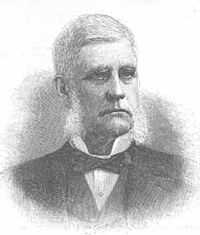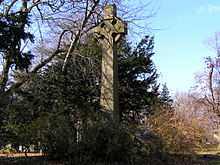Sidney Dillon
| Sidney Dillon | |
|---|---|
 Sidney Dillon | |
| Born |
May 7, 1812 Northampton, New York United States |
| Died |
June 9, 1892 (aged 80) Manhattan, New York United States |
| Occupation | Railroad builder & manager |
| Spouse(s) |
Hannah Smith (1822-1884) (m. 1841–84) (her death) |
| Children |
Cora A. Julia E. ("Julie") |
Sidney Dillon (May 7, 1812—June 9, 1892[1]), an America railroad executive and one the nations premier railroad builders.
Biography
Dillon was born in Northampton, Fulton County, New York.[1] His father, Timothy, was a farmer.[2]
He began his career in the industry working as a water boy on the Mohawk and Hudson Railroad, one of America's earliest railroads, for its construction from Albany to Schenectady, New York.[2]
In 1840 he went into business for himself, forming his own construction company, and obtaining the construction contract for the Boston and Albany Railroad. Dillon married Hannah Smith of Amherst, Massachusetts, in 1841. The couple would have two daughters, Cora A. and Julia E. ("Julie").[2][3] Cora married Dr. Peter B. Wyckoff in 1875.[4] Julia married Gilman Smith Moulton on March 1, 1894.[5]
He was actively involved in the construction of numerous roads, his largest being the Union Pacific Railroad, with which he became actively involved in 1865 through an equity exchange with the Crédit Mobilier of America corporation.
Crédit Mobilier of America was a company setup by the Union Pacific to defraud United States taxpayers in the construction of the First Transcontinental Railroad. The result was the Crédit Mobilier of America scandal which exposed an over-invoicing and a stock & bond share pricing scheme, whereby Union Pacific officers and directors, including Dillon, profited by manipulating the share price of Crédit Mobilier of America's stock shares and bonds, padding invoices to the U.S. Government, and bribing congressmen with shares in Crédit Mobilier of America, cash and other perks.
As one of the principal contractors for the Union Pacific, Dillon's vast experience in the construction of railroads proved invaluable. He took part in the laying of the last rail of the First Transcontinental Railroad in 1869, receiving one of the ceremonial silver spikes used to complete the project.
Following 1870, Dillon was primarily known as a financier, becoming involved with Jay Gould in numerous ventures as well as serving on the board of directors of the Western Union Telegraph Company.
He finally served as President of the Union Pacific Railroad from 1874 to 1884, and again from 1890 until his death in 1892.
Death

Dillon died at his home at 23 West Fifty-Seventh Street in New York City, after a twelve-week illness, at the age of 80.[1] Funeral services were held at the Fifth Avenue Presbyterian Church (55th Street and 5th Avenue) on June 13.[1]
He is interred under a distinctive Celtic cross at Woodlawn Cemetery in Bronx, New York.
Legacy
- His great grandson Sidney Dillon Ripley (1913–2001) was a noted ornithologist, conservationist and secretary of the Smithsonian Institution for twenty years.
- Dillon, Montana is named for him as it was an early terminus for the Railroad.
- Sidney, Nebraska, is also named for him.
References
- ↑ 1.0 1.1 1.2 1.3 "Death of Sidney Dillion". The New York Times. June 10, 1892.
- ↑ 2.0 2.1 2.2 Ingham, John N. (1983). Biographical Dictionary of American Business Leaders 1. Greenwood Publishing Group. p. 272. ISBN 978-0-313-23907-6.
- ↑ Documents of the Assembly of the State of New York 16. New York (State). Legislature Assembly. 1895. p. 20.
- ↑ Miller, William Van Rensselaer (1896). Select Organizations in the United States. Knickerbocker Publishing Company. p. 49.
- ↑ Hiram Carleton, ed. (1903). Genealogical and family history of the state of Vermont. The Lewis Publishing Company. p. 39.
External links
| Preceded by John Duff |
President of Union Pacific Railroad 1874 – 1884 |
Succeeded by Charles F. Adams |
| Preceded by Charles F. Adams |
President of Union Pacific Railroad 1890 – 1892 |
Succeeded by S.H.H. Clark |
|